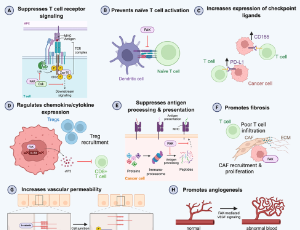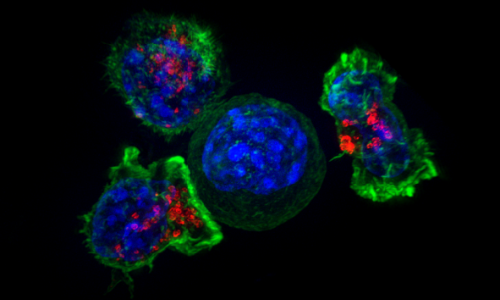Loading
Journal of Cancer Immunology
ISSN: 2689-968X


Sanjay K. Srivastava
Texas Tech University Health Sciences Center, USA
Featured Article
Targeting FAK to Potentiate Immune Checkpoint Therapy in Solid Tumors

Featured Article
Second-Line Systemic Therapies in Metastatic Renal Cell Carcinoma: Current Insights and Future Directions

Featured Article
Effects of Tumor-derived Small Extracellular Vesicles on T cell Survival in Patients with Cancer; A Commentary

About this Journal
The aim of Journal of Cancer Immunology is to publish exciting discoveries on interactive immunology of deadly disease called “Cancer”. The incredible influence of immune system on transformation and growth of tumour has always influenced basic and advanced investigations on cancer. The journal is established with the aim of reporting current updates to cancer research community. Journal features original and promising discoveries in cancer immunology as research, review, novel cases and case series, editorials, correspondence and perspectives after single blind peer review process.
Articles
Should You Be Afraid of the Big Bad Wolf? A Practical Real-world Review for the Comfortable Use of Bosutinib in the Therapy of Chronic Myeloid Leukemia
Bosutinib is a second generation (2G) tyrosine kinase inhibitor (TKI) for the therapy of chronic myeloid leukemia (CML). It is effective, as other 2g TKIs and long term, is likely the safest, with few significant issues. Short term adverse events which have inhibited their use in the past can be overcome with some simple maneuvers which will be reviewed here. The background for bosutinib, patient selection, and a process for successfully starting patients on therapy will be outlined.
Highlighting the Role of DCLK1 in Tumor Invasion and Potential for Therapeutic Intervention
Head and neck squamous cell carcinoma (HNSCC) accounts for nearly 5% of global cancer deaths per year, with epidemiological studies suggesting an expected 30% increase in cases by 2030 due to rising incidence of viral infection (i.e. huma papilloma virus [HPV]). Treatment consists primarily of surgical tumor removal accompanied by post-operative chemoradiation therapy; however, disease recurrence is still an issue amongst 10–26% of patients. Doublecortin-like kinase 1 (DCLK1) is a microtubule-associated protein with dual kinase activity, and upregulation has been associated with poor prognosis in multiple solid tumors.
Re-engineering the Tumor–Immune Interface—Emerging Frontiers in Cancer Immunology and Immunotherapy
Cancer immunology continues to redefine the landscape of oncology, shifting the therapeutic paradigm from direct cytotoxicity toward immune modulation and re-education. The latest publications in the Journal of Cancer Immunology capture this evolution with remarkable clarity—highlighting how manipulating both the tumor microenvironment (TME) and the immune effector landscape can unlock durable anti-tumor immunity
Expanding the Cancer Neoantigen Peptide Repertoire beyond In silico Tools
CD8+ cytotoxic T cells recognise and kill cancer cells that present immunogenic peptides bound to the cell surface major histocompatibility complex class I (MHC-I) molecules.
SHP2 Inhibition as a Promising Anti-cancer Therapy: Function in Tumor Cell Signaling and Immune Modulation
The protein tyrosine phosphatase SHP2, encoded by PTPN11, functions as a critical signal transduction regulator and interacts with key signaling molecules in both RAS/ERK and PD-1/PD-L1/ BTLA (B- and T-lymphocyte attenuator) pathways. Targeting SHP2 pharmacologically, therefore, may be a promising therapeutic strategy for many RAS-driven cancers.
Small-molecule Interferon Inducers for Cancer Immunotherapy Targeting Non-T cell-inflamed Tumors
Since the discovery of escaping mechanism of tumor from negative immune regulation, the paradigm of drug discovery for anti-cancer agents has been dramatically shifted to cancer immunotherapy (e.g., dendritic cell therapy, CAR-T cell therapy, or antibody therapy) by stimulating patient’s immune system to treat cancer.
Emerging Strategies to Attack Polyploid Cancer Cells
Polyploid cancer cells can arise de novo in tumors or they can be induced by therapeutics that inadvertently increase the rate of cytokinetic failure. These cells portend a poor outcome in many cancers because polyploid cancer cells can undergo error prone reductive cell divisions to yield aneuploid progeny. The immune system has evolved mechanisms by which it can specifically recognize and remove polyploid cancer cells, but these appear to be tampered with malignancy so that polyploid cells can persist and fuel the development of cancer cell clones that are resistant to therapeutics and have metastatic potential.
Mitochondria Autoimmunity and MNRR1 in Breast Carcinogenesis: A Review
We review here the evidence for participation of mitochondrial autoimmunity in BC inception and progression and propose a new paradigm that may challenge the prevailing thinking in oncogenesis by suggesting that mitochondrial autoimmunity is a major contributor to breast carcinogenesis and probably to the inception and progression of other solid tumors. It has been shown that MNRR1 mediated mitochondrial-nuclear function promotes BC cell growth and migration and the development of metastasis and constitutes a proof of concept supporting the participation of mitochondrial autoimmunity in breast carcinogenesis.
Inference of Clonal Copy Number Alterations from RNASequencing Data
Tissues are composed of various types of interacting cells [1]. To understand the cellular organization and function in tissues, it is necessary to identify all of the different cell types and the locations of these different cell types within tissue structures. The transformative advances in experimental and computational methods will help us to build the complex map of the tissues and study how tissue organization influences the cell’s molecular state and interactions in healthy and diseased tissue.
Emerging Potential of Plant Virus Nanoparticles (PVNPs) in Anticancer Immunotherapies
Plant virus nanoparticles (PVNPs) are increasingly recognized and studied for use in biomedical applications. PVNPs include plant virions with self-assembled capsid protein coats (PC) that encapsulate the virus genome, and virus-like particles (VLPs), a capsid without the viral genome.
Humanized Chimeric Antigen Receptor (CAR) T cells
In 1989, researchers proposed an intricate strategy in the field of adoptive cell therapy (ACT). Using the T-cell receptor (TCR) as a template, they replaced the coding sequence for the Vα and Vβ chains with the antigen- recognition domains from an antibody (VH and VL chains).
Immune Checkpoint Inhibitors in the Management of Urothelial Carcinoma
Bladder cancer is one of the most common and expensive cancers in the United States, with an expected 81,400 new cases and 17,980 deaths in 2020 alone. The incidence is increased among white men and diagnoses often occur in the 7th decade of life.
Cervical Cancer Prevalence in sub-Saharan Africa and HPV Vaccination Policy: A Public Health Grand Challenge?
“Women are not dying because of diseases we cannot treat. They are dying because societies have yet to make the decision that their lives are worth saving.”
Immunogenic Cell Death: A Step Ahead of Autophagy in Cancer Therapy
Cell Death has long been considered to be an inevitable part of the life cycle of a cell and hence, considered a familiar consequence of cellular life.
SHP2 Inhibition as a Promising Anti-cancer Therapy: Function in Tumor Cell Signaling and Immune Modulation
The protein tyrosine phosphatase SHP2, encoded by PTPN11, functions as a critical signal transduction regulator and interacts with key signaling molecules in both RAS/ERK and PD-1/PD-L1/ BTLA (B- and T-lymphocyte attenuator) pathways. Targeting SHP2 pharmacologically, therefore, may be a promising therapeutic strategy for many RAS-driven cancers.
Effects of Tumor-derived Small Extracellular Vesicles on T cell Survival in Patients with Cancer; A Commentary
Tumor-induced immune suppression has been recognized as one of the major barriers for cancer immune therapies, including checkpoint inhibitors. Immunosuppressive mechanisms that tumors utilize to silence anti-tumor immune cells are numerous and differ between tumor types.
Phosphopeptide Neoantigens as Emerging Targets in Cancer Immunotherapy
Protein post-translational modifications play a vital role in various cellular events essential for maintaining cellular physiology and homeostasis. In cancer cells, aberrant post-translational modifications such as glycosylation, acetylation, and phosphorylation on proteins can result in the generation of antigenic peptide variants presented in complex with MHC molecules. These modified peptides add to the class of tumor-specific antigens and offer promising avenues for targeted anti- cancer therapies. In this review, we focus on the role of phosphorylated peptides (p-peptides) in cancer immunity.
Aromatase Inhibitors and their Connection to Autoimmunity
The aromatase inhibitors (AIs) anastrozole, letrozole, and exemestane are often prescribed as endocrine therapy for patients with estrogen receptor–positive breast cancer. AIs are associated with musculoskeletal side effects such as bone loss, arthralgias, myalgias, and tenosynovitis. Notably, exemestane is a steroidal AI and both anastrozole and letrozole are non-steroidal AIs.
Perioperative Immune Checkpoint Blockade for Muscle-Invasive and Metastatic Bladder Cancer
Checkpoint inhibitors offer promise in treating muscle-invasive and metastatic bladder cancer, but the optimal timing of their administration—neoadjuvant or adjuvant—remains unclear. To determine the efficacy of combining checkpoint inhibition with standard cisplatin-based chemotherapy, we conducted a phase II trial of neoadjuvant anti-PD-1 (αPD-1) and anti-CTLA-4 (αCTLA-4), in combination with cisplatin-gemcitabine, for patients with muscle-invasive bladder cancer prior to radical cystectomy.
Enhancing the Efficacy of CAR-T Cell Therapy: A Comprehensive Exploration of Cellular Strategies and Molecular Dynamics
The emergence of chimeric antigen receptor T cell (CAR-T cell) therapy has revolutionized cancer treatment, particularly for hematologic malignancies. This commentary discusses developments in CAR-T cell therapy, focusing on the molecular mechanisms governing T cell fate and differentiation. Transcriptional and epigenetic factors play a pivotal role in determining the specificity, effectiveness, and durability of CAR-T cell therapy.
The Role of Tumor and Host Microbiome on Immunotherapy Response in Urologic Cancers
The role of the microbiome in the development and treatment of genitourinary malignancies is just starting to be appreciated. Accumulating evidence suggests that the microbiome can modulate immunotherapy through signaling in the highly dynamic tumor microenvironment. Nevertheless, much is still unknown about the immuno-oncology-microbiome axis, especially in urologic oncology. The objective of this review is to synthesize our current understanding of the microbiome’s role in modulating and predicting immunotherapy response to genitourinary malignancies.
About Scientific Archives
Scientific Archives is a global publisher initiated with the mission of ensuring equal opportunity for accessing science to research community all over the world. Spreading research findings with great relevance to all channels without any barrier is our goal. We want to overcome the challenges of Open Access with ensured quality and transparency.

